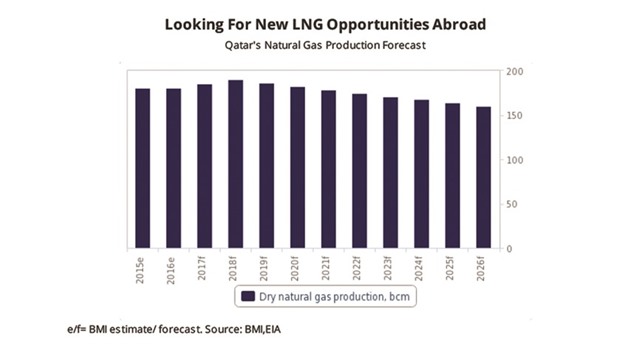Qatar is expected to target a number of key LNG import growth markets in emerging Asia and Latin America, BMI Research has said in a report.
“Certain African countries are also a potential growth hotspot,” the Fitch Group company said in a report. “In particular, with Indian LNG import demand set for rapid growth over the next 10 years, it is likely to be a major target area for LNG infrastructure investment.”
In BMI’s view, Qatar’s expanding investments abroad allows the country to overcome domestic production constraints, diversify its production base and secure new sources of international demand.
Qatar is continuing to expand its presence abroad as it looks to diversify its hydrocarbon investments internationally, the report said.
Alongside this strategic international pivot, Qatar Petroleum (QP) is also reorganising its business internally, integrating the two state-owned gas producers RasGas and Qatargas. The “cost savings and efficiency gains”, BMI noted “will free up additional capital to help fund” the international expansions.
According to BMI, Qatar has acknowledged the limits of focusing purely on domestic hydrocarbons for growth. The nation’s answer to local growth limits is to increase investment abroad, stating that Qatar will look to grow international investments over the next two years in both upstream and downstream assets.
“The investments have two main areas of focus,” BMI said.
The first is expanding its production and resource base through equity stakes in hydrocarbon fields abroad.
The second is facilitating demand for its products abroad, primarily for LNG in key growth markets by investing in developing import infrastructure.
BMI report notes that Qatar’s upstream forays include a 40% stake in Cyprus’s offshore exploration block 10, where it is partnering up with ExxonMobil, which has taken the remaining 60% as well as QP’s 30% stake in each of Chevron’s deep-water licences in Morocco.
The American major will retain a 45% interest and remains the operator in the sub-salt play.
The Qatar Investment Authority teamed up with Glencore in December last year to buy a 19.5% stake in Russian oil giant Rosneft.
On the downstream investments side, BMI said that in Pakistan, QP is collaborating with Total, Mitsubishi, ExxonMobil and Hoegh to build a LNG import facility.
The consortium will look to build a floating storage and regasification unit (FSRU), a jetty and a pipeline, with the FRSU to have a capacity of 750mn cubic feet of gas per day by 2018, BMI noted.
“You will see us going internationally with some of the partners we have in Qatar, this year and next year. We are in growth mode, “QP president and chief executive officer Saad Sherida al-Kaabi said in Doha recently.
QP stated that it is exploring for oil and gas in Morocco and Cyprus as it aims to expand its LNG assets abroad.
Qatar shipped 76.4mn tonnes of LNG in 2014, or 32% of global supply, according to the International Group of Liquefied Natural Gas Importers, an agency dispatch showed.
Business / Eco./Bus. News
Qatar may target key LNG import growth markets in Asia, Latin America: BMI

QATAR

